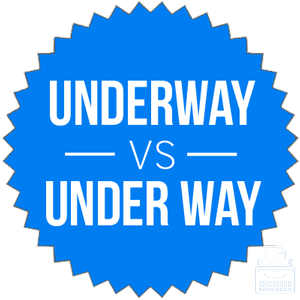If an event has already begun, we could also say that it is under way. Or is it underway?
Technically, it could be either, but in the above sentence, writers would traditionally use under way, not underway.
Both of these terms are adjectives, and they both mean the same thing, but there are subtle usage differences that writers have historically take note of.
What is the Difference Between Underway and Under Way?
In this post, I will outline the traditional rule regarding these two words while comparing under way vs. underway. I will use each variation in at least one example sentence, so you can see how it appears in context.
Plus, I will show you a helpful mnemonic device that will make choosing under way or underway a bit easier.
When to Use Under Way
 What does under way mean? Under way is an adverb that means in progress. It can also be an adjective, where it has the same meaning, except that it modifies nouns instead of verbs.
What does under way mean? Under way is an adverb that means in progress. It can also be an adjective, where it has the same meaning, except that it modifies nouns instead of verbs.
When used as an adjective, under way is used after the sentence’s verb. This part of the sentence is called its predicate, so under way is technically a predicate adjective. It still functions the same as any other adjective. The only difference is the part of the sentence where it appears.
For example,
- “The matinee is already under way,” said the usher, refusing to open the doors until the end of the scene.
- “Once the flight gets under way and we reach cruising altitude, the flight crew will serve complimentary soft drinks,” said the captain.
When to Use Underway
 What does underway mean? Underway is an adjective. It means the same thing as under way does when it is an adjective. The only difference is that underway is normally used directly before the noun it modifies, instead of after a verb.
What does underway mean? Underway is an adjective. It means the same thing as under way does when it is an adjective. The only difference is that underway is normally used directly before the noun it modifies, instead of after a verb.
One could write that the proceedings are under way, for instance, or instead simply reference the underway proceedings. These phrases mean the same thing, but the second is shorter and simpler, which can be advantageous.
For example,
- The underway games are nearly over, but a few more will start soon.
- The underway transformation from egg, to larva, to pupa, to adult, is called metamorphosis, and will take the organism roughly three months.
Can Underway Always Be A Single Word?
What I have outlined above is the traditional rule regarding underway vs. under way. This rule is still outlined in many dictionaries, but underway is increasingly being used as a single word in all of its senses, especially in phrases like get underway and be underway, which would traditionally be spelled as two words.
Until recently, many major newspapers split the word in two. The AP Stylebook recently (2013) changed its stance and accepted underway in all senses.
Its entry on the word states,
- underway: One word in all uses.
It seems that writers are moving toward the one-word spelling in all senses, so while some may notice that you have the words separated, most people will not even notice it.
Additionally, the closed spelling seems more natural and it a welcome change. The traditional distinction is a bit complicated and doesn’t offer much, if any, clarity in use.
Trick to Remember the Difference
 If you do choose to observe the traditional rule, here is a helpful mnemonic. But remember, the current trend appears to be toward the closed compound: underway.
If you do choose to observe the traditional rule, here is a helpful mnemonic. But remember, the current trend appears to be toward the closed compound: underway.
Only under way functions as an adverb. If that is how you are using the term, separate it into two words.
As an adjective, though, the only difference between these variants is where in the sentence they appear. Underway comes before nouns, while under way comes after verbs.
Since under way and after verbs each have two words and three syllables, remembering that under way comes after verbs is not difficult.
Summary
Is it underway or under way? Under way and underway are both adjectives that mean in progress.
- Historically, under way was an adverb and adjective that followed nouns; underway was an adjective that preceded nouns.
- Most modern writers are moving toward underway in all sense.
Contents
